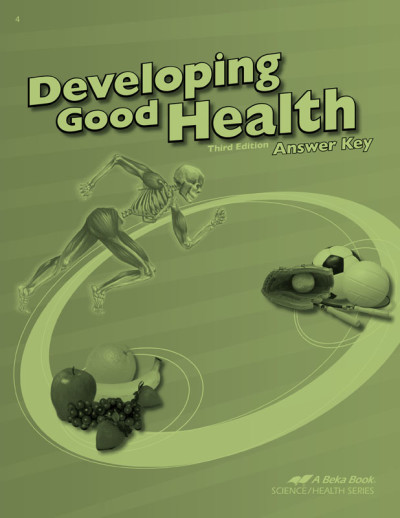We use cookies to make your experience better. To comply with the new e-Privacy directive, we need to ask for your consent to set the cookies. Learn more.
Developing Good Health Answer Key (3rd Edition)
The text answer key includes the question and answers to the “Quick Checkup" and chapter “Checkup' questions.
Evaluate your child's answers to each "Quick Checkup" within Developing Good Health. This consolidated Answer Key contains the stated question and answer for each "Quick Checkup" and "Chapter Checkup." This teaching resource allows you to quickly check your child's work for accuracy and understanding.
Focusing on caring for our body as the temple of God, this traditional curriculum introduces the importance of healthy living, safety habits and good manners from the elementary years through adulthood. In first through sixth grade, health follows science in the scope and sequence (see individual descriptions for the course length). The 7th grade Life Science course weaves the health instruction into the science text. Upper-level health (grade 8-12) is one semester and may be taken at any point. Abeka includes it in the 9th grade Student and Parent Kits, although parents can determine the best time for their student to begin.
Several components may be necessary to successfully teach Abeka Health depending on the grade level. Teacher editions, homeschool teaching charts, lesson plans, student editions, activity books, quizzes/tests/worksheets, and corresponding answer keys may be needed. Student books are softcover, and the teacher resources are spiral bound or soft cover. See individual grade descriptions for complete information. ~Deanne
Revised in 2023, the 4th edition of Developing Good Health is the companion course to Abeka’s Understanding God’s World (5th edition). Topically, students learn about the human body (nervous, circulatory, immune, digestive, and skeletal/muscular systems), personal care and first aid/emergency preparedness, and spiritual-mental/emotional and social health and awareness from a biblically conservative perspective. The new edition is not compatible with the previous edition. Please note, the new edition has separate lesson plans, compared to the previous edition that provided combined Science and Health lesson plans.
Components are available separately or combined with Science in the Parent and Child Kits. Components include the Textbook and Answer Key, the Activity Book and Answer Key, the Quiz/Test Book and Answer Key, the Health 4 Homeschool Curriculum Lesson Plans and the Health 4 Homeschool Teaching Charts. Also available are the Science and Health Grade 4 Parent Kit and Child Kit. Both are recommended for success. The Parent Kit includes the Homeschool Science Curriculum Lesson Plans, Understanding God's World Answer Key, Quiz and Test Key, and the STEM Activity Book Key, as well as the Homeschool Health Curriculum Plans, Developing Good Health Answer Key, the Quiz and Test Key, and the Activity Key. It also includes the Science 4 Flashcards, the Homeschool Science 4 Teaching Charts, and the Homeschool Health Teaching Charts. The Child Kit includes the Exploring God's World text, the STEM Activity Book, Quiz and Test Book, and the Developing Good Health Text, Activity Book, and the Quiz/Test Book. ~Deanne
| Product Format: | Paperback |
|---|---|
| Brand: | A Beka Book |
| Grade: | 4 |
| Length in Inches: | 11 |
| Width in Inches: | 8.5 |
| Height in Inches: | 0.125 |
| Weight in Pounds: | 0.1 |

